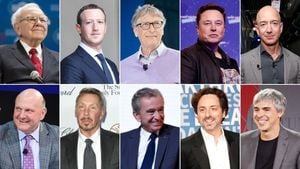With the 2024 U.S. election looming, the role of celebrity endorsements has become increasingly volatile and contentious, particularly for Vice President Kamala Harris. This election season saw high-profile figures like Taylor Swift, Beyoncé, and Lady Gaga stepping onto the political stage, rallying behind Harris' bid for the presidency. Yet, as the dust settles after the election, experts and observers are left wondering whether these endorsements held any weight with the electorate or merely reinforced existing biases.
Kamala Harris' campaign was bursting at the seams with star power. From concerts featuring Bruce Springsteen to performances by Megan Thee Stallion and appearances by A-listers like Jennifer Lopez, the Harris campaign sought to channel the vibrant energy of Hollywood to sway voters. After all, these endorsements were meant to evoke excitement and draw younger voters who are often more attuned to the music and cultural spheres than traditional political rhetoric.
But did it actually resonate? After months of anticipation, it became evident through post-election analysis and polling data, celebrity endorsements may not have been the golden ticket many had hoped for. According to several studies, when it came to Harris, the star-studded strategy might have backfired. A rapid message test by Grow Progress revealed celebrities like Beyoncé and Eminem, meant to galvanize support, didn't significantly alter voters’ opinions, and some endorsements actually detracted from Harris' appeal.
Offering her endorsement during a key rally, Beyoncé's declaration—positioning herself not as just a celebrity but as “a mother”—was reported to have made viewers less favorable toward Harris, particularly among younger white individuals and Trump voters. This unintended fallout exemplified the pitfalls of celebrity-driven campaigns; when these powerful personalities fail to connect on substantive issues, their presence can be perceived as out-of-touch.
Harris' campaign similarly faced scrutiny from the other side of the political aisle. While Donald Trump's camp hosted its own out-sized celebrity moments, such as endorsements from Kid Rock and operational support from figures like Joe Rogan, many observers noted the distinct effectiveness of these endorsements compared to Harris' efforts. Rogan's wide-ranging podcast, which draws millions of listeners, especially younger voters, was lauded for reaching audiences on topics they find relevant. This strategic engagement with issues, rather than mere celebrity appearances, may very well have boosted Trump's standing among demographics Harris aimed to capture.
The differences between how each candidate utilized their celebrity endorsements become glaringly apparent when reviewing the demographic data. Trump’s endorsements, unlike those of Harris, often appeared to resonate more deeply with voters concerned about economic stability and personal values. Polls revealed stark contrasts: 69 percent of Trump supporters believed the U.S. economy was faltering, compared to just 29 percent of Harris voters. This disconnect underlines how celebrity endorsement, without clear alignment and connection to voter concerns, risks widening the gap rather than bridging it.
Interestingly, public sentiment surrounding celeb-fueled campaigns is far from straightforward. A YouGov poll indicated varying perceptions following the endorsement of Taylor Swift. While her endorsement initially boosted her favorability among Democrats, it concurrently prompted declines among Republicans. This division highlights the inherent risks of aligning with celebrity culture: much like social media influencers, these personalities, when misconstrued, tend to polarize rather than unite.
Another layer of complexity emerges when considering the cultural backdrop of 2024. Harris’ candidacy, backed by the entertainment elite, played directly to the coastal demographic—those who consume and cherish Hollywood's brand of idealism. Yet, for many voters from more conservative or less affluent backgrounds, there's often skepticism surrounding the authenticity of endorsements from the financially privileged celebrities. These voters are less interested in lofty ideals placated by concerts or clever slogans and more driven by pressing needs such as job security and economic relief.
So, where does this leave celebrity endorsements as tools for political campaigns? With the lessons from this contentious election, it’s evident they do not guarantee traction or influence, particularly when severed from relevant dialogue about tangible issues impacting everyday lives. The emergence of larger cultural movements like the “manosphere” shifts the narrative, placing greater emphasis on authenticity and relevance over mere star power.
Voters appear increasingly savvy about discerning genuine engagement from surface-level charm. The catchphrases and vibrant performances can only go so far—real conversations about policy, economic stability, and community concerns now hold far more influence.
Looking to the future, political candidates will need to recalibrate their approaches to celebrity endorsements. Celebrities can still be influential, but their endorsements must come with genuine advocacy of policies and relatable narratives, rather than mere platitudes. Candidates aiming for success may need to seek out more genuine partnerships with celebrities who can engage on real-world issues, rather than relying solely on the shimmer of stardom.
After all, as we’ve seen, voters are not swayed solely by who warms the stage during rallies but by how well candidates connect with the real concerns and aspirations of the electorate. The 2024 election has undoubtedly highlighted the shifting dynamics of celebrity endorsements—perhaps it’s time for candidates to think outside the box when it’s time to build bridges to the public.



